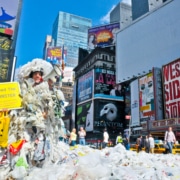What’s the deal with the Plastic Soup again?
March 15 2024 That’s what readers of news site nu.nl on their comment platform Nujij were wondering. In a recent […]
30 Oktober 2020
The Beat the Microbead app was an instant international success since its launch in May this year. But, since Teun van de Keuken demonstrated the app in the broadcasts of the Keuringsdienst van Waarde and Jinek, the Dutch have also discovered the Plastic Soup Foundation app in large numbers. Beat the Microbead is ranked no. 1 in the Health and Fitness category in the Apple App Store.
Van de Keuken asked the cosmetics industry why producers add plastic and why they are not transparent about it? Because who immediately understands what exactly polymethyl methacrylate is? Or polyethylene terephthalate? ‘A chemistry degree and a microscope, that’s what you need to detect microplastics in cosmetics,’ was the conclusion of the Keuringsdienst van Waarde.
A couple of days later, Van de Keuken called on all viewers at Jinek to use the Beat the Microbead app to scan all their care products to see whether they contain plastic and, if so, which types. Within a few days, the count shot up from 180,000 downloads to 276,743, with 656,200 new products being scanned within a week.
In the absence of clear information, the enthusiasm – to find out which products contain plastic using an app is in line with previous research results.
Time and again, it has been shown that consumers are concerned about the presence of plastic in care products. Plastic Soup Foundation previously published the results of a survey that showed that 70% of the Dutch people want a ban on the intentional addition of plastic. And research by the Consumers’ Association showed that no less than 74% are concerned about the health effects of microplastics.
Microplastics are all plastics smaller than five millimeters, and they consist of a mixture of synthetic polymers and chemical additives. Beat the Microbead recognizes more than 500 micro and nanoplastics labeled as potential plastics by the European Chemicals Agency (ECHA), environmental organization UNEP, and engineering firm Tauw.
Meanwhile, the Plastic Soup Foundation is waiting for a reservoir of imported products with plastic ingredients, 70,000 to be exact. These need to be checked one by one and then added to a database that contains more than 10,700 products already.
This database is available as a knowledge base for consumers and scientists, who are increasingly concerned about the possible effects on the environment and our health. This knowledge is also an instrument in the fight against the industry, which is increasingly adding plastic. We have even found Teflon as an ingredient in various makeup products.
Based on current data, this is the top 5 scanned brands that score highest in microplastics:
And this is the top 5 plastics most commonly found:
The so-called ‘microbeads,’ round plastic granules that were added as an abrasive to toothpaste, scrubs, and shower gels, are nowadays hardly found in products. This can really be called the result of the campaigns that the Plastic Soup Foundation has been running since 2012 and the questions that consumers have been raised by these campaigns that have bombarded producers worldwide.
The cosmetics industry opposes the upcoming European legislation in microplastics and still tries to keep day creams and sunscreens etc. with plastic on the market. There is active lobbying to include in the definition of microplastics a lower limit of 100 nanometers (0.1 micrometers) so that the smaller ‘nanoplastics’ can continue to be used.
In December, ECHA will present its final opinion, and politicians in Brussels will decide whether and in what form microplastics will be banned in numerous products, including cosmetics.
In January 2019, ECHA already came up with a proposal to reduce the use of deliberately added microplastics by at least 85 percent. The proposed restriction, if adopted, would mean that 400,000 tons of fewer microplastics would be released into the environment in Europe in the next twenty years.
Please help us in the fight against microplastics! Since the broadcasts of the Keuringsdienst van Waarde and Jinek, we have been flooded with new users and products. So help our crowdfunding and donate now!
Letter to the cosmetics industry
Letter to the decision makers & politicians
March 15 2024 That’s what readers of news site nu.nl on their comment platform Nujij were wondering. In a recent […]
The first Impact Fair is Europe’s largest Impact Experience. An interactive ‘immersive’ experience of impactful examples.
The waste-export to countries outside of the EU has been restricted The Netherlands is against a carpet ban on shipping of plastic waste.
The waste-export to countries outside of the EU has been restricted The Netherlands is against a carpet ban on shipping of plastic waste.

 Americans contribute most to the plastic soup
Americans contribute most to the plastic soup